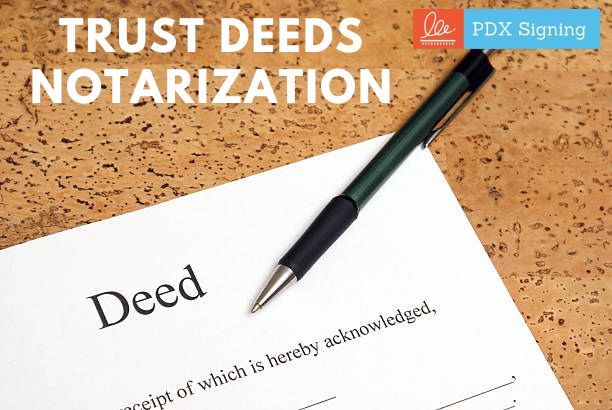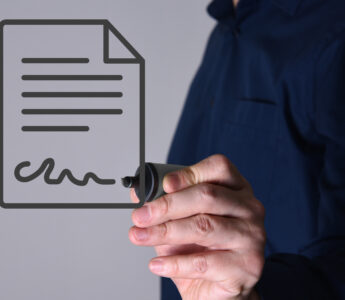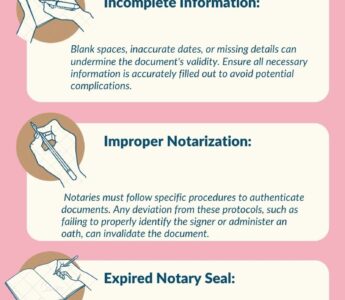What Kinds of Deeds Can Be Notarized
When it comes to legal documents, notarization is often a crucial step to ensure their validity and authenticity. Notaries play a vital role in this process by verifying the identity of the signers and ensuring that they are signing the document willingly. One of the common types of documents that require notarization is a deed. […]
October 05, 2023

When it comes to legal documents, notarization is often a crucial step to ensure their validity and authenticity. Notaries play a vital role in this process by verifying the identity of the signers and ensuring that they are signing the document willingly. One of the common types of documents that require notarization is a deed. In this blog post, we will explore the various kinds of deeds that can be notarized and the importance of notary services for deeds of trust, wills and testament notarization, and power of attorney.
1. Deed of Trust Notarization:
A deed of trust, also known as a trust deed, is a legal document that is commonly used in real estate transactions. It outlines the terms of a loan and the borrower’s agreement to use their property as collateral for the loan. Notarization of a deed of trust is crucial to prevent fraud and to ensure that all parties involved understand the terms and implications of the agreement. The notary public will verify the identities of the parties involved and witness their signatures on the document.
2. Wills and Testament Notarization:
A last will and testament is a document that outlines a person’s final wishes regarding the distribution of their assets and the care of their dependents after their death. Notarizing a will adds an extra layer of validity and credibility to the document. It helps ensure that the person creating the will is of sound mind and not under duress when making these critical decisions. Notarization also makes it more difficult for anyone to challenge the will’s authenticity later on.
3. Power of Attorney Notarization:
A power of attorney (POA) is a legal document that grants one person the authority to make decisions and act on behalf of another person, often in financial or healthcare matters. Notarizing a power of attorney is essential to prevent abuse or misuse of the authority granted. The notary will verify the identity of the person granting the power (the principal) and ensure that they understand the implications of the document. This added layer of security protects the interests of both the principal and the appointed agent.
Why is notarization important?
Notarization serves several critical purposes:
- Preventing Fraud: Notaries act as impartial witnesses, verifying the identities of the parties involved and ensuring that they are signing the document voluntarily.
- Protecting Vulnerable Individuals: In cases like power of attorney and wills, notarization helps ensure that the parties involved are making informed decisions and are not under duress or coercion.
- Enhancing Document Validity: Notarized documents carry a higher level of credibility and are more likely to be accepted by courts, financial institutions, and other entities.
- Preventing Disputes: Notarization can help prevent disputes over the authenticity of documents, which can be time-consuming and costly to resolve.
Choosing a Notary Public for Your Deeds:
When you need notary services for deeds of trust, wills and testament notarization, or power of attorney, it’s essential to choose a reputable notary public. Look for a professional who is licensed, experienced, and knowledgeable about the specific requirements for notarizing these types of documents. Additionally, make sure to bring proper identification and any necessary witnesses to the notarization appointment to ensure a smooth process.
In conclusion, notarization plays a critical role in validating and safeguarding legal documents, including deeds of trust, wills, and power of attorney. Whether you are involved in a real estate transaction, estate planning, or granting someone power of attorney, notary services are essential to ensuring the integrity and legality of your documents. So, when the time comes, be sure to seek out the services of a qualified notary public to assist you in notarizing these important documents.
FAQ
PDX Signing offers notary services for a wide range of deeds, including deeds of trust, warranty deeds, quitclaim deeds, and more. Our experienced notaries are here to assist with all your deed-related notarization needs.
Yes, appointments are recommended to ensure our notaries are available to assist you promptly. When you visit us, please bring a valid photo ID, the unsigned deed document, and any additional parties who need to sign the deed. Proper identification and all involved parties are crucial for a smooth notarization process.
Yes, PDX Signing specializes in notarizing deeds related to real estate transactions, such as deeds of trust, warranty deeds, and more. Our notary services help ensure the legality and authenticity of these crucial documents, providing peace of mind in your property dealings.





